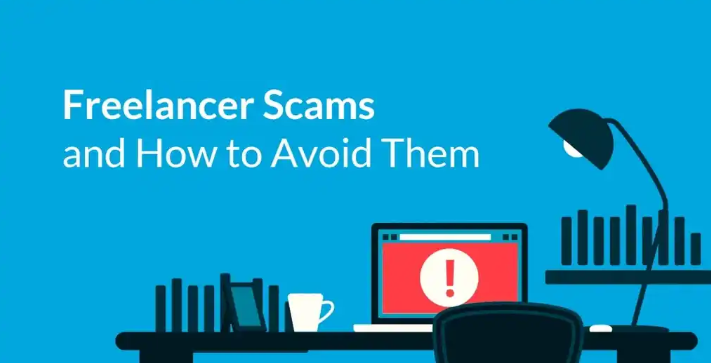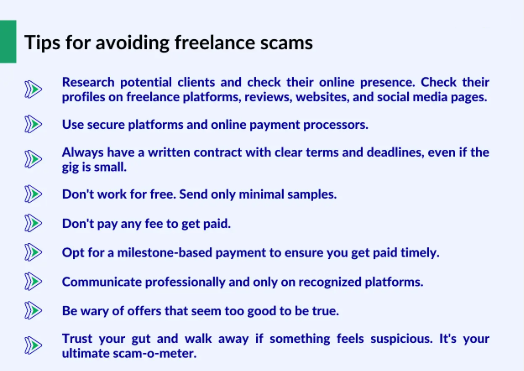In today’s digital age, freelancing has become a famous way for students to make money while studying. Platforms such as Upwork, Fiverr, and Freelancer offer countless possibilities for working with clients worldwide. However, the angle of freelancing has also led to a surge in online scams. As a student, being conscious of the red flags is essential to avoid falling victim to these Freelancing Scams. This guide will help you remain safe while freelancing and protect your finances.

Fake Job Listings
One of the most common scams students face is fake job listings. So, these listings often sound too good, delivering a high-paying job with little effort. For example, a data entry job with a hefty salary for simple tasks or a writing gig offering a significant payout for short articles. Once you accept the job, they might ask for an upfront payment or your personal information under the guise of a “registration fee.”
How to Avoid It: Always research the company or client before accepting any offer to protect freelancing scams. Legitimate employers will never ask for money upfront. If something feels suspicious, trust your instincts and move on.
Phishing Scams
Phishing is a tactic scammers use to steal your personal information, such as passwords or bank account details. These scams often come in emails or messages from clients who claim they need your account information to process payments or verify your identity. The message might look official, but getting you to provide sensitive data is a trick.
How to Avoid It: Never share personal or financial details through email or untrusted websites to avoid freelancing scams. Always double-check the sender’s email address and verify the legitimacy of the communication through official channels.
Unrealistic Deadlines and Offers
Scammers often push students to complete tasks within tight, unrealistic deadlines. They might promise a significant payout but pressure you to submit work quickly without proper compensation. After submission, the scammer might claim the work is unsatisfactory or refuse to pay.
How to Avoid It: Set clear boundaries with clients and ensure they understand what can be realistically achieved within a specific time frame to avoid freelancing scams. This helps you manage your workload and gives you control over your freelancing career. Always agree on deadlines and payment terms before starting any project.
Non-Payment After Work Completion
Another common scam is when a client refuses to pay after finishing the work. This can be incredibly frustrating for students who rely on freelancing for income. Scammers often disappear after receiving the completed work, leaving you no way to get paid.
How to Avoid It: Use platforms that offer secure payment systems, like Upwork or Fiverr to avoid freelancing scams. So, these systems protect freelancers by holding funds in escrow, which means the platform has the funds until the job is completed and both parties are comfortable. It’s also wise to ask for partial payments upfront for larger projects.
Fake Reviews and Ratings
Some scammers create artificial profiles with glowing reviews to attract new freelancers. These reviews may seem real, but they’re often part of a scheme to attract students to accept scam jobs. Once you agree to the job, you may discover that the client is either difficult to work with or has no intention of paying you.
How to Avoid It: Always check for verified reviews and research the client’s profile. Look for specific details in the reviews, like project details and communication style, to ensure they are authentic. If the reviews are incomplete or too perfect, proceed with caution. Trust authentic feedback from other freelancers.
Overpayment Scams
In an overpayment scam, a client may send you a check or transfer more money than agreed upon, asking you to repay the difference. The check is often fake, and once you refund the money, the client disappears, leaving you out of pocket.
How to Avoid It: If a client overpays, directly report it to the platform or refuse to bear money until the payment clears. Be careful of anyone asking for large refunds.

Conclusion:
Freelancing can be a rewarding and flexible way for students to make income, but staying alert to potential scams is essential. Always verify job listings, avoid sharing personal details, set realistic client expectations, and use secure payment platforms. By being cautious and informed, you can empower yourself to protect yourself from freelancing scams and focus on building a successful freelancing career.






